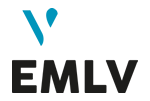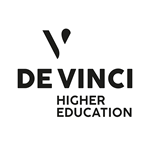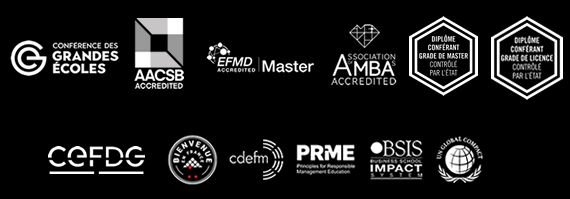This immersive experience, in the heart of Parisian Luxury, is designed to explore and apply key theories of customer experience. Look inside the world of Parisian luxury through the experiences of EMLV’s MSc Luxury & Innovation Management students.
Over two months, they dedicated more than 18 hours to fieldwork, working closely with leading fashion, jewellery, and fine food and drink brands. This hands-on approach allowed them to put six key customer experience theories into practice, helping them understand how luxury works on the ground.
Exploring the many faces of Parisian luxury
The students visited a range of high-end brands across different sectors of the luxury market, including:
- Fashion & Leather Goods: Louis Vuitton, Dior, Armani, Hermès, Loewe
- Watches & Jewelry: Cartier, Patek Philippe
- Wine & Spirits: Les Caves Taillevent
They observed, interviewed staff, and spoke with clients to explore how each brand creates its version of a luxury experience. These real-world visits helped them see which classroom ideas hold up in practice and where the reality might differ.
This kind of firsthand exposure is highly valued in the industry. According to a 2024 LinkedIn Talent Insights report, over 75% of luxury recruiters prioritize candidates with direct in-store brand experience, especially in customer engagement and experiential design roles.
For students, these visits are more than observation; they’re preparation for the expectations of the luxury sector.
A closer look at the brand experiences
Dior Boutique: Elegance in Every Detail
For the students, the Dior boutique visit offered in-depth insights into how high-fashion brands deliver refined, detail-oriented experiences. Every aspect of the space reflected the house’s commitment to immersive, aesthetic storytelling, from the welcoming staff to the branded hot drinks served in Dior mugs.

Inside the Dior boutique
Louis Vuitton, Champs-Élysées: A Signature Experience
The students described Louis Vuitton’s flagship store as the epitome of luxury retail. The store’s multi-level layout, ambient scent, and multilingual staff set the tone for a premium journey. Guests were invited to browse limited-edition pieces, all contributing to a sense of exclusivity and elevated identity.
Cartier: Luxury Rooted in Emotion
At Cartier, the emotional connection stood out. Students appreciated how each visitor was treated with the same care and attention, whether they planned to buy or not. This reinforced the idea that luxury today is just as much about relationships and storytelling as beautiful products.

Visiting Cartier
Contrasting Encounters: Armani, Fendi & Cartier
Not every experience was the same. At Armani, the atmosphere felt more distant and formal, starkly contrasting with the warm and welcoming service they encountered at Fendi and Cartier. These differences sparked meaningful conversations among students about how much people and service styles shape how a brand is perceived.
Learning through doing
This experience is a core part of EMLV’s pedagogic strategy. Students develop a more in-depth understanding of the industry by entering the field and observing luxury.
It gives them space to think critically, apply what they’ve learned, and build the skills they’ll need in the real world.
Furthermore, this hands-on model has also proven to have an impact. According to AACSB (2023), graduates from business programs that include experiential learning are 40% more likely to secure jobs aligned with their career goals within six months of graduation.
EMLV’s offer to prepare a Career in Luxury
Luxury brands are evolving—and fast. According to Bain & Company, the global luxury market is projected to grow by 5–7% annually through 2030, with strong momentum driven by Gen Z and Millennial consumers, who are expected to represent over 70% of the market by 2025.
At the same time, the shift to digital and sustainable business models is transforming the types of roles luxury brands are hiring for. McKinsey reports that luxury companies increasingly seek talent in customer experience design, omnichannel strategy, and responsible sourcing.
EMLV’s MSc Luxury & Innovation Management is built to meet this evolving demand. The program equips students with the tools to lead digital transformation, integrate sustainability into brand strategy, and meaningfully connect with global clients.
The luxury industry currently supports more than 1.2 million jobs worldwide. It is projected to grow by 10% over the next five years, particularly in roles tied to innovation, customer experience, and sustainability (Bain & Company, 2024).
Ready to step into the World of Luxury?
EMLV’s MSc Luxury & Innovation Management offers a practical, forward-thinking path into the industry if you’re passionate about luxury and want to contribute to its future.
The program combines expertise in management, digital strategy, and luxury brand development to prepare students for real challenges facing global luxury brands, such as digital transformation, sustainability, and shifting customer expectations.
Through immersive learning experiences like this fieldwork, regular industry visits, and networking opportunities, students gain the tools to lead, innovate, and shape the future of luxury.





















